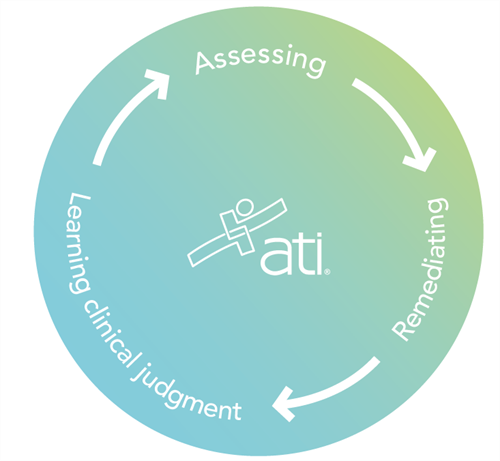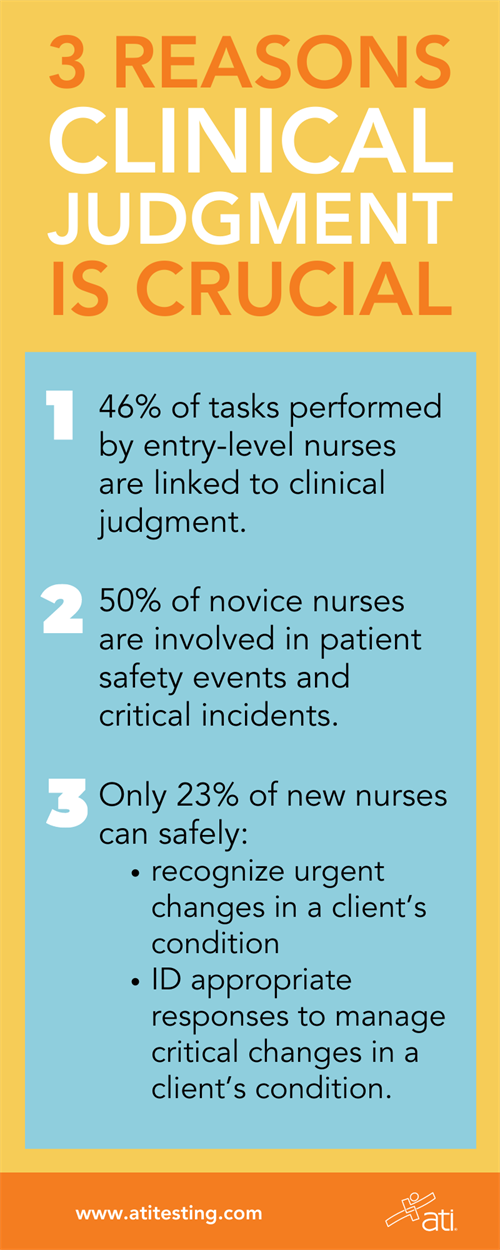Why you absolutely must understand more than the new item types
How assessments are crucial to student success in preparing for the NGN
With the advent of the Next Generation NCLEX (NGN), many educators believe that if they understand the new item types and give students plenty of practice with them, then their job is done. The task, however, is not quite so easy.
 For students to be prepared for the NGN, they must develop the clinical judgment skills to be safe, competent nurses. Ada Woo, PhD, ATI V.P. of Innovative Learning Sciences, says success in developing those skills is tied more closely to assessments than how to answer, say, a “multiple-response — select ‘N.’”
For students to be prepared for the NGN, they must develop the clinical judgment skills to be safe, competent nurses. Ada Woo, PhD, ATI V.P. of Innovative Learning Sciences, says success in developing those skills is tied more closely to assessments than how to answer, say, a “multiple-response — select ‘N.’”
But before you can connect the dots between assessments and clinical judgment, it’s helpful to understand why clinical judgment is important. (See the boxed information below for those facts.) Founded in that knowledge, you can more easily trace the connections: assessing ➔ remediating ➔ learning clinical judgment ➔ assessing ➔ remediating, etc.
ATI has offered standardized assessments for nursing education for more than a decade. Now, with NCLEX changes coming, we are updating our assessments to align with the new exam and underscore the importance of delivering safe care. Similarly, we’ve amped up resources to help teach clinical judgment.
Assessments — and standardized testing — are key to tracking and remediating students’ learning to ensure their success in becoming practice-ready nurses.
See a list of some of these evidence-based resources in the section below. You can also gain a better understanding of the importance of standardized assessments in nursing education and ATI’s stance on high-stakes testing (see heading below, "Standardized tests & high-states testing").

What you can do: Rely on evidence-based assessment tools
- Proven to predict early nursing school performance.1
- The most widely used standardized test for nursing program eligibility.
- A research-based tool with objective details about NCLEX preparedness.2
- Helps predict a student’s probability of passing the NCLEX.
An expansive item bank for quick, easy assessment creation plus the option to create custom items. Helps prep for NGN:
o Add NGN item types to assessments
o Create standalone (bow-tie and trend) or case study items
o Access instructions for creating NGN items directly in the tool
o Apply enhanced scoring options (0/1, +/-, rationale) per NCSBN guidance.
• Content Mastery Series (CMS).
- Provides test data showing students’ mastery of NCLEX-specific concepts.
- Updates include RN/PN NGN item types.
The importance of standardized assessments in nursing education

Standardized assessments aid in:
• Developing practice-ready nurses.
To graduate competent, safe-practicing professionals, “Standardized exit exams … should be embraced as evidence-based, academically rigorous evaluation tools.”3
• Remediating to develop crucial knowledge and skills.
“These tests can identify weak areas.”4 Research shows remediating — practicing “active retrieval of knowledge” — improves students’ “long-term meaningful learning.”5
• Ensuring use of the highest-quality test items.
Experts with “the necessary resources to develop high-quality, rigorous test items similar to the NCLEX-RN” are responsible for today’s standardized tests.3
• Preparing for the Next Generation NCLEX.
The NGN will be more cognitively complex. Its multiple interacting elements will require “a great deal of computational power in working memory. If test-takers have not encoded that information for easy retrieval and use, their ability to answer … will be severely diminished.”3
Standardized tests & high-stakes testing
The Accreditation Commission for Education in Nursing (ACEN) says the use of standardized tests for high-stakes testing is “not a best educational practice and is strongly discouraged.”6
(Many state boards suggest limiting high-stakes tests to 10 percent or less of a student’s grade.)
Similarly, ATI does not design — nor recommend —its tests for high-stakes purposes. Instead, use ATI assessments to:
- Better understand student comprehension of key concepts
- Predict students’ probability of success in high-stakes situations
- Follow up with focused remediation to strengthen knowledge.
NEXT STEPS
• Visit atitesting.com/data-science to read the research behind ATI’s standardized tests.
• See the NGN’s impact on ATI assessments and solutions ("5 options to stay on top of your NGN needs") for details.
RESOURCES
1Predicting early nursing school performance in an ADN program: How do the ATI TEAS preparedness levels predict RN CMS Fundamentals performance? Atitesting.com. Published 2021. Accessed Nov. 3, 2021. https://www.atitesting.com/docs/default-source/default-document-library/atiteas_fund_adn_2018060632c461bc4cce66048db9ff0000a90651.pdf%22%20%5Ct%20%22_blank
2Research brief: Evaluating the predictive power of ATI’s 2010 RN Comprehensive Predictor. Atitesting.com. Published 2013. Accessed Nov. 3, 2021. www.atitesting.com/docs/default-source/research/research-brief---rn_cptonclex.pdf?sfvrsn=c7e006e9_0..
3Glasgow MES, Dreher HM, Schreiber J. Standardized testing in nursing education: Preparing students for NCLEX-RN and practice.
J Prof Nursing. 2019;35(6):440-446. doi: https://doi.org/10.1016/j.profnurs.2019.04.012.
4Li Y, Turinetti M, Fang D. Special survey on vacant faculty positions for academic year 2018-2019. American Association of Colleges of Nursing. Oct. 2019. https://www.aacnnursing.org/Portals/42/News/Surveys-Data/Vacancy18.pdf
5Karpicke JD. Retrieval-based learning: Active retrieval promotes meaningful learning. Curr Dir Psychol Sci. 2012;21(3):157-163. doi: 10.1177/0963721412443552.
6Report to constituents 2020. Accreditation Commission for Education in Nursing; 2021. Accessed Nov. 3, 2021. https://www.acenursing.org/About/Report-to-Constituents/RTC2020.pdf.
